Related Research Articles
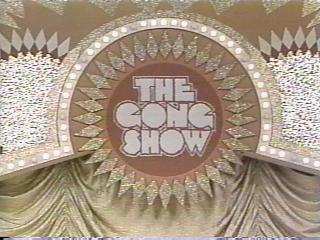
The Gong Show is an American amateur talent contest franchised by Sony Pictures Television to many countries. It was broadcast on NBC's daytime schedule from June 14, 1976, through July 21, 1978, and in first-run syndication from 1976 to 1980 and 1988 to 1989, and was revived in 2017 for broadcast on ABC. The show was created and originally produced by Chuck Barris, who also served as host for the NBC run and from 1977 to 1980 in syndication. Its most recent version was executive-produced by Will Arnett and hosted by Tommy Maitland, a fictional character performed by Mike Myers. The Gong Show is known for its absurdist humor and style, with the actual competition secondary to the often outlandish acts presented; a small cash prize has typically been awarded to each show's winner.

The Tonight Show is an American late-night talk show that has been broadcast on NBC since 1954. The program has been hosted by six comedians: Steve Allen (1954–1957), Jack Paar (1957–1962), Johnny Carson (1962–1992), Jay Leno, Conan O'Brien (2009–2010), and Jimmy Fallon (2014–present). Besides the main hosts, a number of regular "guest hosts" have been used, notably Ernie Kovacs, who hosted two nights per week during 1956–1957, and a number of guests used by Carson, who curtailed his own hosting duties back to three nights per week by the 1980s. Among Carson's regular guest hosts were Joey Bishop, McLean Stevenson, David Letterman, David Brenner, Joan Rivers, and Jay Leno, although the practice has been mostly abandoned since hosts currently prefer reruns to showcasing potential rivals. Fallon has used guest hosts rarely, co-hosting the May 24, 2021, broadcast with Dave Grohl, Jimmy Kimmel hosting the April 1, 2022, broadcast, Shawn Mendes co-hosting the April 29, 2022, broadcast, Megan Thee Stallion co-hosting the August 11, 2022, broadcast, Demi Lovato co-hosting the August 17, 2022, broadcast, and Jack Harlow co-hosting the October 6, 2022, broadcast.
A television film, alternatively known as a television movie, made-for-TV film/movie, telefilm, telemovie or TV film/movie, is a feature-length film that is produced and originally distributed by or to a television network, in contrast to theatrical films made for initial showing in movie theaters, and direct-to-video films made for initial release on home video formats. In certain cases, such films may also be referred to and shown as a miniseries, which typically indicates a film that has been divided into multiple parts or a series that contains a predetermined, limited number of episodes.
Variety show, also known as variety arts or variety entertainment, is entertainment made up of a variety of acts including musical performances, sketch comedy, magic, acrobatics, juggling, and ventriloquism. It is normally introduced by a compère or host. The variety format made its way from the Victorian era stage in Britain and America to radio and then television. Variety shows were a staple of English language television from the late 1940s into the 1980s.
E! Entertainment Television is an American basic cable television network. It is owned by the NBCUniversal Media Group division of Comcast's NBCUniversal. The channel focuses primarily on pop culture, celebrity based reality shows and movies.

Nick at Nite is a nighttime programming block on the American basic cable channel Nickelodeon. The programming broadcasts from prime time to late night. The block initially consisted of syndicated sitcoms and films from the 1950s to the 1970s. Nick at Nite gradually shifted its programming to primarily airing sitcoms as recent as the mid-1990s to the 2010s.
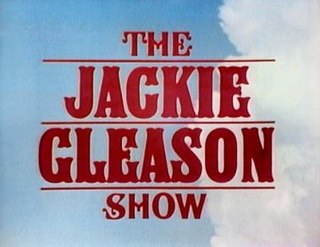
The Jackie Gleason Show is the name of a series of American network television shows that starred Jackie Gleason, which ran from 1952 to 1970, in various forms.

The Big Show was an American radio variety program featuring 90 minutes of comic, stage, screen and music talent. It was aimed at keeping American radio in its classic era, robust against the rapidly growing television tide. For a good portion of its year-and-a-half run, the show's quality made its ambition seem plausible.
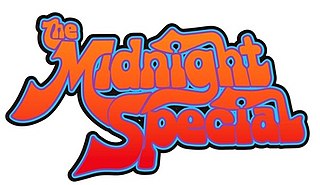
The Midnight Special is an American late-night musical variety series originally broadcast on NBC during the 1970s and early 1980s, created and produced by Burt Sugarman. It premiered as a TV special on August 19, 1972, and then began its run as a regular series from February 3, 1973, to March 27, 1981. The 90-minute program aired on Saturday mornings at 1 a.m. ET/PT after the Friday night edition of The Tonight Show Starring Johnny Carson.

Friday Night Videos is an American music video/variety program that aired from July 29, 1983, to May 24, 2002, on NBC. Originally developed as an attempt by the network to capitalize on the emerging popularity of music videos, which had been brought into the mainstream by MTV during the early 1980s, the program shifted over to a general music focus in 1990, mixing in live music performances alongside the video showcases. Upon being retitled Friday Night in 1994, its format was expanded to incorporate a variety of entertainment content to supplement, and eventually surpass, the music videos. The program evolved into its final format in 2001 under the title Late Friday, removing the music and feature segments and becoming dedicated solely to showcasing new stand-up comedy talent.
America's Got Talent is a televised American talent show competition, and is part of the global Got Talent franchise created by Simon Cowell. The program is produced by Fremantle USA and Syco Entertainment, and broadcasts on the NBC television network. It premiered on June 21, 2006, after plans for a British edition in 2005 were suspended, following a dispute within the British broadcaster ITV. Production would later resume in 2007, following the success of the first season. Each season is mainly run during the network's summer schedule, and has featured various hosts over the course of the program's history. The current host is Terry Crews.

The Music Scene is a television series aired by the ABC Television Network in its Fall 1969 lineup, featuring primarily rock and pop music. The 45-minute program aired Mondays at 7:30 pm. It was paired with a second 45-minute program, The New People, to form a 90-minute block intended to compete with the more popular offering on NBC, Rowan & Martin's Laugh-In.

The Colgate Comedy Hour is an American comedy-musical variety series that aired live on the NBC network from 1950 to 1955. The show featured many notable comedians and entertainers of the era as guest stars. Many of the scripts of the series are archived at the UCLA Library in their Special Collections.
The following is the 1951–52 network television schedule for the four major English language commercial broadcast networks in the United States. The schedule covers primetime hours from September 1951 through March 1952. The schedule is followed by a list per network of returning series, new series, and series cancelled after the 1950–51 season. This was the first television season of national network interconnection by coaxial cable and microwave, meaning programming could be transmitted live coast-to-coast if needed.

The Tomorrow Show is an American late-night television talk show hosted by Tom Snyder that aired on NBC in first-run form from October 1973 to December 1981, at which point its reruns continued until late January 1982.

The Marriage Ref was an American reality television show and panel game hosted by comedian Tom Papa and produced by Jerry Seinfeld, in which a rotating group of celebrities decides the winners of real-life marital disputes. The show premiered on NBC on Sunday, February 28, 2010 on the final night of the Olympics before moving to Thursdays. The show's second season debuted on June 26, 2011.

The Tonight Show Starring Jimmy Fallon is an American late-night talk show hosted by actor and comedian Jimmy Fallon that airs on NBC. The show premiered on February 17, 2014, and is produced by Broadway Video and Universal Television. It is the seventh incarnation of NBC's long-running Tonight Show franchise, with Fallon serving as the sixth host. The show also stars sidekick and announcer Steve Higgins and house band The Roots. The Tonight Show is produced by Katie Hockmeyer and executive-produced by Lorne Michaels. The show records from Studio 6B in Rockefeller Center, New York City, which is the same studio in which Tonight Starring Jack Paar and then The Tonight Show Starring Johnny Carson were produced from 1957 until 1972.
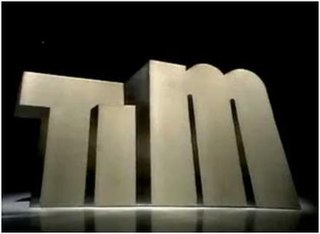
The Tim Conway Show – the second of two television series of the name – is a 1980–1981 American variety/sketch comedy television show starring Tim Conway. It aired on CBS from March 22, 1980 to May 17, 1980, and from September 20, 1980 to March 7, 1981.
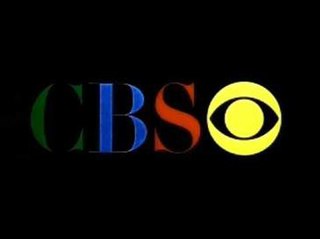
CBS Thursday Night Movie was the network's first venture into the weekly televising of then-recent theatrical films, debuting at the start of the 1965–1966 season, from 9:00 to 11 p.m.. CBS was the last of the three U.S. major television networks to schedule a regular prime-time array of movies. Unlike its two competitors, CBS had delayed running feature films at the behest of the network's hierarchy. Indeed, as far back as 1960, when Paramount Pictures offered a huge backlog of pre-1948 titles for sale to television for $50 million, James T. Aubrey, program director at CBS, negotiated with the studio to buy the package for the network. Aubrey summed up his thinking this way: "I decided that the feature film was the thing for TV. A $250,000 specially-tailored television show just could not compete with a film that cost three or four million dollars." However, the network's chairman, William Paley, who considered the scheduling of old movies "uncreative", vetoed the Paramount transaction.
References
- 1 2 McNeil, Alex (1996). Total Television: the Comprehensive Guide to Programming from 1948 to the Present (4th ed.). New York, New York: Penguin Books USA, Inc. p. 95. ISBN 0-14-02-4916-8.
- ↑ Brown, Les (March 12, 1980). "CBS First in TV Ratings: First 'Big Show' 16th" . The New York Times. p. C 26. Retrieved February 6, 2024.
- 1 2 Brooks, Tim; Marsh, Earle F. (June 24, 2009). The Complete Directory to Prime Time Network and Cable TV Shows, 1946-Present. Random House Publishing Group. pp. 142–143. ISBN 978-0-307-48320-1 . Retrieved February 6, 2024.
- 1 2 3 4 "TV: NBC Extravaganza, 'The Big Show,' Bows" . The New York Times. March 4, 1980. p. C 16. Retrieved February 6, 2024.